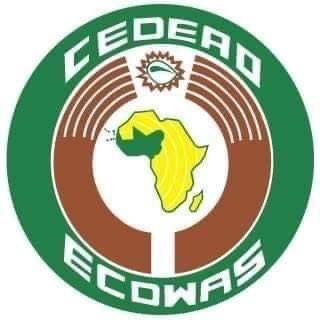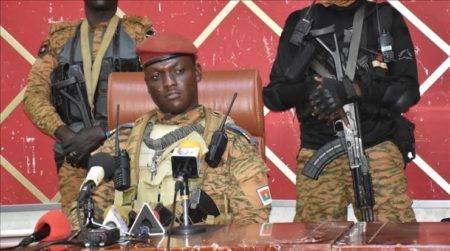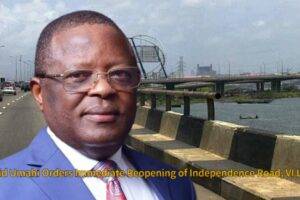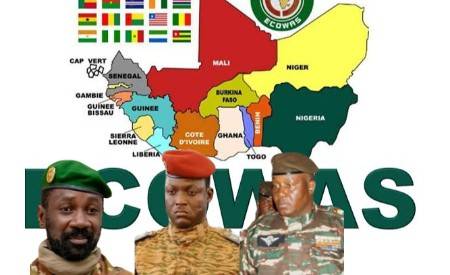Burkina Faso, Mali, and Niger jointly announced their immediate departure from the Economic Community of West African States (ECOWAS) in a press release broadcasted on Niger national television. The joint statement, delivered by Colonel Amadou Abdramane, the spokesman for the Niger junta, revealed that after 49 years of membership, the three nations express regret and disappointment over the deviation of ECOWAS from the ideals set by its founding fathers and the spirit of Pan-Africanism.
The decision marks a significant shift in the geopolitical landscape of West Africa, as these nations have been integral members of Economic Community of West African States since its establishment in 1975. The departure underscores growing discontent within the region regarding the efficacy and direction of the regional economic organization. As the affected nations break away, questions arise about the potential impact on regional cooperation, trade, and security, considering the historical role Economic Community of West African States played in fostering stability and collaboration among member states.
Challenges to ECOWAS Unity and Concerns for Regional Stability
Colonel Abdramane emphasized that the departure is a response to what the nations perceive as a departure from the core principles that Economic Community of West African States was built upon. While specific grievances were not outlined in the joint statement, it hints at a broader dissatisfaction with the organization’s ability to address regional challenges effectively. This development poses challenges for Economic Community of West African States in maintaining its unity and effectiveness, potentially creating a vacuum in regional leadership.
Furthermore, the withdrawal of Burkina Faso, Mali, and Niger raises concerns about the impact on ongoing regional initiatives and efforts, including those related to economic integration, peacekeeping, and conflict resolution. The departure may lead to a reevaluation of alliances and partnerships within West Africa, as neighboring nations assess the implications of this fracture within the regional bloc. As Economic Community of West African States faces this unexpected crisis, its ability to adapt and address the concerns of its remaining members becomes crucial for maintaining stability and fostering continued cooperation in West Africa.

ECOWAS Reacts to Withdrawal of Mali, Niger, and Burkina Faso
The Economic Community of West African States (ECOWAS) is facing a significant challenge following the announcement by Mali and Niger on the National Televisions about their decision to withdraw from the regional alliance. Burkina Faso has joined the fray, making it a trio of member states seeking to leave ECOWAS. The Economic Community of West African States Commission, however, is yet to receive any official communication from the three nations regarding their intention to exit the community.
In response to this unexpected development, the Economic Community of West African States Commission, acting on the directives of the Authority of Heads of State and Government, has been actively engaged with Burkina Faso, Niger, and Mali. The primary focus has been on restoring constitutional order within these countries. Despite the withdrawal threats, Economic Community of West African States emphasizes that Burkina Faso, Niger, and Mali continue to be crucial members of the community. The Authority affirms its dedication to finding a diplomatic and negotiated resolution to the prevailing political impasse, demonstrating a commitment to maintaining stability and unity within the West African region.
ECOWAS Commission’s Ongoing Commitment and Further Pronouncements
The ECOWAS Commission remains vigilant and deeply concerned about the potential ramifications of the withdrawal of Mali, Niger, and Burkina Faso from the regional bloc. While no formal notification has been received, the Commission acknowledges the importance of these nations to the overall strength and coherence of Economic Community of West African States.

As the ECOWAS Commission closely monitors the situation, it pledges to make additional statements and pronouncements as the developments unfold. The regional body is steadfast in its commitment to addressing the political challenges in Burkina Faso, Niger, and Mali through peaceful means. By maintaining an open channel of communication and diplomatic engagement, ECOWAS aims to find common ground with the withdrawing member states, ensuring the resolution of the political impasse in a manner that upholds the principles of democracy, stability, and cooperation within the West African community. The Economic Community of West African States Commission’s ongoing commitment reflects the region’s collective effort to navigate challenges and preserve the unity that has been a cornerstone of the organization.
Economic Repercussions Loom as Niger, Mali, and Burkina Faso Withdraw from ECOWAS
Niger, Mali, and Burkina Faso have decided to withdraw from the Economic Community of West African States (ECOWAS), marking a significant act of economic self-sabotage. This move comes amidst an epic economic crisis, raising concerns about the consequences for the citizens of these nations. Withdrawing from a regional economic bloc that facilitates trade, cooperation, and stability seems profoundly unwise, especially when the global community is grappling with economic challenges.
Ordinary citizens, often misled into believing that such actions serve their interests, are likely to become the primary victims of this imprudent decision. ECOWAS has played a crucial role in fostering economic integration, easing cross-border movements, and providing a platform for joint efforts in addressing regional challenges. The withdrawal of these nations not only isolates them from their closest neighbors but also leaves them without a viable alternative to ECOWAS, adding further uncertainty to their economic future.

The Fate of Citizens Living Abroad with ECOWAS Passport
One pressing question arising from the withdrawal is the fate of citizens from Niger, Mali, and Burkina Faso who currently reside in other ECOWAS member states. These individuals, holding ECOWAS passports, have enjoyed the benefits of free movement within the region. The sudden withdrawal puts their status and rights in jeopardy, creating a complex web of challenges.
Citizens residing in countries such as Benin, Cabo Verde, Cote d’Ivoire, The Gambia, Ghana, Guinea, Guinea-Bissau, Liberia, Nigeria, Senegal, Sierra Leone, and Togo may face uncertainties regarding their legal status, rights to employment, and access to essential services. The abrupt decision by their home countries’ military juntas raises questions about the diplomatic and legal mechanisms that will be put in place to address the concerns of these citizens.
The withdrawal of Niger, Mali, and Burkina Faso from ECOWAS not only poses a threat to regional economic stability but also leaves citizens in a state of uncertainty, particularly those living in other member states. The decision, driven by narrow and narcissistic motives, underscores the importance of thoughtful regional cooperation in addressing shared challenges, and its repercussions will undoubtedly reverberate across the West African region.
Table of Contents
Discover more from OGM News NG
Subscribe to get the latest posts sent to your email.














